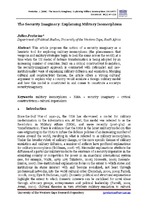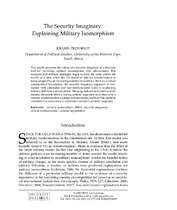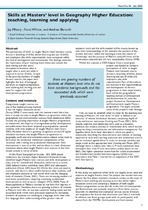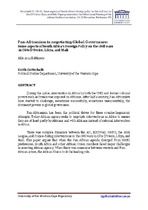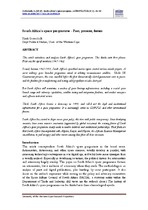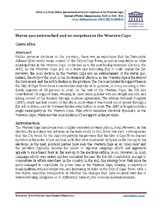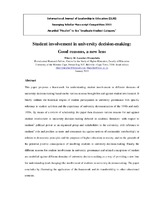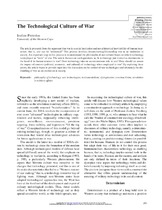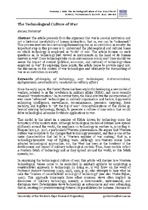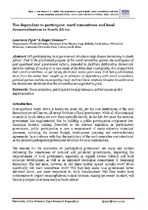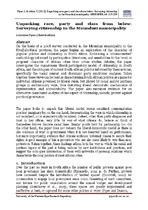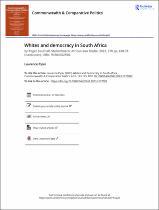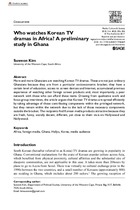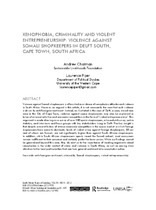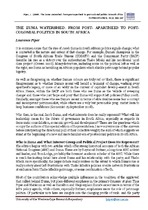Browsing Research Articles (Political Studies) by Title
Now showing items 65-80 of 80
-
The Security imaginary: Explaining military isomorphism
(Sage, 2008)This article proposes the notion of a security imaginary as a heuristic tool for exploring military isomorphism (the phenomenon that weapons and military strategies begin to look the same across the world) at a time ... -
The security imaginary: Explaining military isomorphism
(SAGE, 2008)This article proposes the notion of a security imaginary as a heuristic tool for exploring military isomorphism (the phenomenon that weapons and military strategies begin to look the same across the world) at a time when ... -
Skills at masters’ level in Geography Higher E: Teaching, learning and applying
(Taylor & Francis, 2006)The perceptions of ‘skills’ at taught Master's level between course directors (teaching of skills), alumni (learning and use of skills) and employers (the skills requirements) were compared within the field of development ... -
Some aspects of South Africa’s foreign policy on the civil wars in Côte D’Ivoire, Libya, and Mali
(2013)During the 1960s, intervention in Africa by both the UNO and former colonial powers such as France was imposed on Africans. After half a century, Pan-Africanists have started to challenge, sometimes successfully, sometimes ... -
South Africa's space programme - Past, present, future
(Routledge, 2010)This article introduces and analyses South Africa’s space programme. This divides into three phases. First was the age of amateurs 1947-1962. Second, between 1963-1993, South Africa’s apartheid ancien regime started ... -
Status quo entrenched and no surprises in the Western Cape
(South African Association of Public Administration and Management (SAAPAM), 2016)Unlike previous elections in the province, there was an expectance that the Democratic Alliance (DA) would retain control of the City of Cape Town, as well as consolidate in other municipalities in the Western Cape. In ... -
Student involvement in university decision-making: Good reasons, a new lens
(2011-04-04)This paper proposes a framework for understanding student involvement in different domains of university decision-making based on the various reasons brought for and against student involvement. It briefly outlines the ... -
The technological culture of war
(SAGE, 2008)The article proceeds from the argument that war is a social institution and not a historical inevitability of human interaction, that is, war can be “unlearned.” This process involves deconstructing/dismantling war as an ... -
The Technological culture of war
(Sage, 2008)The article proceeds from the argument that war is a social institution and not a historical inevitability of human interaction, that is, war can be “unlearned.” This process involves deconstructing/dismantling war as an ... -
Too dependent to participate: ward committees and local democratisation in South Africa
(Routledge, 2009)Will participatory local government structures help deepen democracy in South Africa? That is the proclaimed purpose of the ward committee system, the centre- piece of post-apartheid local government reform, intended to ... -
Unpacking race, party and class from below: surveying citizenship in the Msunduzi Municipality
(Elsevier, 2012)On the basis of a 2008 survey conducted in the Msunduzi municipality in the KwaZulu-Natal province, the paper begins an exploration of the character of popular politics and citizenship in South Africa. Embracing a ... -
Whites and democracy in South Africa
(Taylor and Francis Group, 2023)In this wide-ranging book, Professor Roger Southall interrogates the attitudes ofwhite South Africans in respect of politics, democracy, and race relations in thecountry. The book is organised into three sections: thefirst ... -
Who watches Korean TV dramas in Africa? A preliminary study in Ghana
(Sage, 2018)More and more Ghanaians are watching Korean TV dramas. These are not just ordinary Ghanaians because they are from a particular socioeconomic bracket; they have a certain level of education, access to screen devices and ... -
Why treating water scarcity as a security issue is a bad idea.
(The Conversation Africa, 2018)Helen Zille, the Premier of the Western Cape in South Africa, has made two startling claims about the water crisis in the province. She says there will be anarchy when the taps run dry, and that normal policing will be ... -
Xenophobia, criminality and violent entrepreneurship: violence against Somali shopkeepers in Delft South, Cape Town, South Africa
(Taylor & Francis; Unisa Press, 2012)Violence against Somali shopkeepers is often cited as evidence of xenophobic attitudes and violence in South Africa. However, as argued in this article, it is not necessarily the case that such violence is driven by ... -
The Zuma watershed: from post-apartheid to post-colonial politics in South Africa
(Routledge, 2010)Introduction: It is common cause that the rise of Jacob Zuma in South African politics signals change; what is contested is the nature and extent of that change. For example, Zuma's champions in the Congress of South African ...

